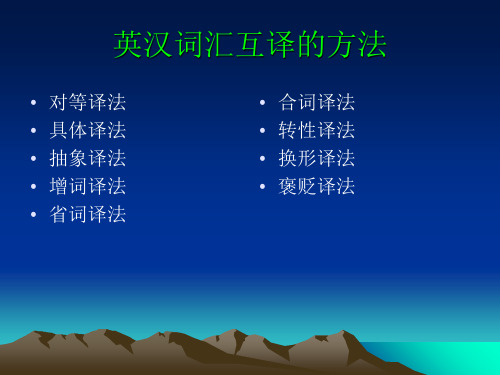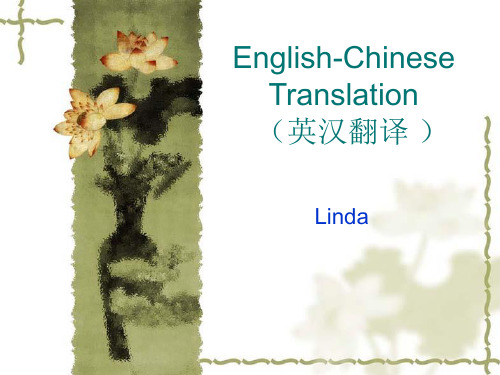英译汉教学转性译法
[实用参考]汉译英翻译技巧之转性词翻译.ppt
![[实用参考]汉译英翻译技巧之转性词翻译.ppt](https://img.taocdn.com/s3/m/9bbd6287bb4cf7ec4afed0d7.png)
earthquake.(动词转译形容词)
二、名词的转译
• 1、名词转化为动词
•
英语中有一部分动词是从名词派生而来的,有的英语
名词同时可以兼做动词用。汉语中的名词,尤其是抽象名
词,如果也把它们翻译成英语名词,那么句子就会不地道,
不符合英文的习惯。在这种情况下,我们可以把这些汉语
名词译为相应的英语动词,原来主语、表语或宾语的定语
就译为英语中的主语。例如:
•
1)雄伟的人民大会堂给我们留下了深刻的印象。
•
The magnificent Great Hall of the People impressed us
tremendously.
•
2)他的画的特点是笔力沉着,色彩鲜艳。His paintings
are characterized by steady strokes and bright colors.
enthusiasm of his hospitality.
•
她身体虽弱,但思想健康。
•
She is physically weak but mentally sound.
•
注解:名词“身体”和“思想”转换成了副词
“physically”和“mentally”。
(二)副词转译形容词或形容词转译副词
•
(动2词)的操转作译机器需要懂得机名器词的的一转些译性能。 形容词或副词的转译
•
The operation of a machine needs some knowledge of its function(动词转
译名词)
•
(3)他到商店去买酱油。
•
He went to the shop for a bottle of sauce.(动词转译介词)
英汉翻译中的词性转换

英汉翻译中的词性转换一、本文概述翻译,作为语言交流的桥梁,在跨文化、跨语言的交流中扮演着至关重要的角色。
英汉翻译,作为其中最为常见和重要的分支之一,其技巧与方法对于提高翻译质量和效率具有深远的影响。
在英汉翻译实践中,词性转换是一种常见的翻译技巧,其运用得当与否直接影响到译文的质量。
本文旨在探讨英汉翻译中的词性转换现象,分析其必要性、常见类型及其在英语汉语言特点下的应用,以期为翻译实践提供有益的参考和指导。
本文将简要介绍英汉翻译中词性转换的必要性,阐述为何在翻译过程中需要进行词性转换,以及这种转换对于提高翻译质量的重要性。
本文将详细分析英汉翻译中常见的词性转换类型,包括名词与动词之间的转换、形容词与副词之间的转换等,并结合具体实例进行说明。
本文将探讨英汉翻译中词性转换的应用策略,结合英语和汉语的语言特点,分析如何在实际翻译中灵活运用词性转换技巧,以实现译文的准确、流畅和地道。
通过本文的阐述和分析,希望能够帮助读者更好地理解和掌握英汉翻译中的词性转换技巧,提高翻译实践中的应变能力和翻译质量,推动英汉翻译事业的不断发展和进步。
二、词性转换的基本概念词性转换,即在翻译过程中,将源语言中的某一词类转换为目标语言中的另一词类,而不改变其原意,是英汉翻译中一种常见的翻译技巧。
这种技巧的运用,旨在使译文更加地道、流畅,更符合目标语言的表达习惯。
在英汉翻译中,由于两种语言的语法结构和表达习惯存在差异,因此,翻译时常常需要进行词性转换。
例如,英语中的动词在汉语中可能需要转换为名词、形容词或副词;同样,汉语中的名词在英语中也可能需要转换为动词、形容词或副词。
这种转换并不是随意的,而是需要基于对源语言和目标语言的理解和掌握,以及对翻译原则的遵循。
词性转换的翻译技巧可以分为两类:一是完全转换,即源语言中的某一词类完全转换为目标语言中的另一词类;二是部分转换,即源语言中的某一词类在转换为目标语言时,仍然保留部分原词类的特性。
课件:转换译法

• 二、 名词可转译成动词 • ① 含有动作意味的名词往往可以转译成动
词。
• Every morning she would go to the lake area for a walk.
• 四、形容词转译成名词 • ① 有些形容词加上定冠词表示某一类人,
汉译时常译成名词。
• They did their best to help the poor. • 他们尽最大努力帮助穷人。 • ② 由名词派生的形容词可转译成名词。
• The Wilde family were religious. • 王尔德全家都是虔诚的教徒。
如characterize, symbolize, design, cost, behave等, 这些动词在英语中用得很普遍,但是翻译成汉语 时却很难找到与之对等的词因此,译成汉语时, 常常转译为名词。
• Such materials are characterized by good insulation (绝缘) and high resistance to wear.
• The government called for the establishment of more technical schools.
• My suggestion is that he should quit smoking at once.
• Millions of people in the mountains areas are finally off poverty.
• 每天早上,她都要到湖区去散步。
• The operation of a computer needs some knowledge of English.
英汉笔译—转性译法

Chinese character: not inflective in form not definite in part of speech when taken separately
Classification of Parts of Speech
Sameness nouns; verbs; modifiers as adjectives or adverbs; forewords as prepositions and conjunctions; Differences articles(冠词),relative pronouns(关系代 词),relative adverbs(关系副词), participles(分词),gerunds (动名词)and infinitives(不定式) don’t exist in Chinese.
transformation of adjective into verb
Transformation
Definition: "By transformation,we mean that in translation a word in one language belonging to a certain part of speech is not necessarily to be turned into one of the same part of speech in another language." (Eugene A.Nida language, Culture and Translating) Aim: aimed at seeking equivalence and achieving the maximal expressiveness
汉译英翻译技巧之转性词翻译.

转性译法常用情况
• • • • • • • • • • • • 一、动词的转译 : 汉语的一个显著特点是大量使用动词,有时,一个句子会出现多个动词。而 英语中,一个句子通常只有一个主动词;汉语中动词使用比较频繁,当翻译 成英语时,常用名词、形容词、介词、副词等词来译 (1)医生建议我多锻炼一些。 The doctor gave me some advice of doing more exercise.(动词转译名词) ( 2)操作机器需要懂得机器的一些性能。 动词的转译 形容词或副词的转译 名词的转译 The operation of a machine needs some knowledge of its function(动词转 译名词) (3)他到商店去买酱油。 He went to the shop for a bottle of sauce.(动词转译介词) (4)一座跨越杭州湾的大桥已经开始建设。 A bridge has been under construction, which will span the Hangzhou Bay. (动词转译名词) (5)获悉贵国遭受地震,我们极为关切。 We are deeply concerned at the news that your county has been struck by an earthquake.(动词转译形容词)
汉译英词法翻译技巧
之转性译法
1
转性译法定义及使用的原因:
• 转性译法是指在翻译过程中,根据译语的规范,把原 句中某种词类的词转换成另一种词类的词,也就是 我们通常所说的词类转换。 • 英语和汉语的词类大部分重合,但是在汉语中一 个词可以充当的的句子成分比英语中一个词能充 当的句子成分多。例如,英语中充当主语的只有 代词、名词或相当于名词的动名词或不定式,充 当谓语的大多为动词;而汉语中,名词、动词、 形容词都可以做主语、谓语、宾语以及表语。因 此,为了保证译文忠实于原文并合乎表达,可以 改变词类。
常用十大英汉互译翻译技巧

常用十大翻译技巧英汉两种语言在句法、词汇、修辞等方面均存在着很大的差异,因此在进行英汉互译时必然会遇到很多困难,需要有一定的翻译技巧作指导。
常用的翻译技巧有增译法、省译法、转换法、拆句法、合并法、正译法、反译法、倒置法、包孕法、插入法、重组法和综合法等。
1、增译法:指根据英汉两种语言不同的思维方式、语言习惯和表达方式,在翻译时增添一些词、短句或句子,以便更准确地表达出原文所包含的意义。
这种方式多半用在汉译英里。
汉语无主句较多,而英语句子一般都要有主语,所以在翻译汉语无主句的时候,除了少数可用英语无主句、被动语态或"There be?结构来翻译以外,一般都要根据语境补出主语,使句子完整。
英汉两种语言在名词、代词、连词、介词和冠词的使用方法上也存在很大差别。
英语中代词使用频率较高,凡说到人的器官和归某人所有的或与某人有关的事物时,必须在前面加上物主代词。
因此,在汉译英时需要增补物主代词,而在英译汉时又需要根据情况适当地删减。
英语词与词、词组与词组以及句子与句子的逻辑关系一般用连词来表示,而汉语则往往通过上下文和语序来表示这种关系。
因此,在汉译英时常常需要增补连词。
英语句子离不开介词和冠词。
另外,在汉译英时还要注意增补一些原文中暗含而没有明言的词语和一些概括性、注释性的词语,以确保译文意思的完整。
总之,通过增译,一是保证译文语法结构的完整,二是保证译文意思的明确。
如:(1)What about calling him right away? 马上给他打个电话,你觉得如何?(增译主语和谓语)(2)If only I could see the realization of the four modernizations.要是我能看到四个现代化实现该有多好啊!(增译主句)(3)Indeed, the reverse is true 实际情况恰好相反。
(增译名词)(4)就是法西斯国家本国的人民也被剥夺了人权。
翻译技巧之转化法

三、 转译成形容词
1.名词变形容词 • He found some difficulties to design a reactor without a computer.
• 她感到没有电脑要设计反应堆是困难 的。 • They admitted the feasibility of our proposal. • 他们承认我们的建议是可行的。
或者带有否定意义的词缀dedisimunlessopportunemomentdivertattentionfrom失败没做成抓住机会不失时机欺骗性的靠不住的发牢骚不满意反对对着不符合自然规律正如所期望的那样不出所料空前的史无前例的分散注意力不考虑在价格之上无价的在10英里之内不到10英losetimeindecisive不安全的危险的不喜欢厌恶情绪没有留下怀疑清清楚楚地不失去时间赶快不识字的人文盲不完全的残缺的不能阅读的人睁眼瞎不经常的偶尔的没面子的丢面子不同寻常的异乎寻常的不能决定的优柔寡断的立场语气的需要一表达习惯的需要invitationonlykeepupright
Ex:
1. Undoubtedly they don’t have the intention of making an engineer of him, and I suspect they never will. 2. The application of electronic computers makes for a tremendous rise in labor productivity. 3. The engine has given a constantly good performance. 4. Professor Wilson is said to be a lady killer. 5. The well known scientist was a great lover of literature when he was a child. 6. Differences between the social systems of states shall not be an obstacle to their contact and cooperation.
英译中技巧

英译中翻译技巧一、翻译总的原则1. 表达应建立在理解的基础上。
2.翻译时既要忠实于原文,又要符合汉语的习惯。
3.翻译不可太拘泥于原文的形式。
二、翻译技巧1.词法翻译1.1增词译法为使译文在语法、语言形式上符合译文习惯和在文化背景、词语联想方面与原文一致起来,使得译文在与原文在内容、形式和精神等三方面都对等起来,需在原文的基础上添加必要的词、词组、分句或完整句。
e.g. 1) They were frank and candid with each other in a relaxed way.译文:他们相互之间开诚布公、直言不讳而且气氛十分轻松。
2)Suppose the preparatory work should not be completed.译文:准备工作完成不了,那可怎么办?3)Our rushing is understandable, but costly.译文:人们的忙碌是可以理解的,但是为此付出的代价却是昂贵的。
试比较:1) 他喜欢指出别人的缺点,但用意是好的。
译文:He likes to point out other people’s shortcomin gs, but he means well.(增加主语)2)屋里准有人,我听见有人声。
译文:There must be someone in the room, for I heard a voice. (增加连接词)说明:增词译法在英译汉中主要是添加原文中虽无形式却意在其中的成分;在汉译英中一般是增添原文中为了语言简洁而被省去的成分如,主语、宾语、物主代词、连接词、介词等1.2减词译法就是把原文中需要的译文中不需要的词、词组等在翻译时加以省略,以适应译文语法和习惯表达法的需要。
e.g. 1)One must make painstaking effort before one could succeed in mastering a foreign language.(省略主语)译文:要掌握一门外语,非下苦功不可。
转性译法

• The flowing of current first in one direction and then in another makes an alternating current. 电流先向一个方向流动,然后又向另一个方向流动,形成 交流电 ②.含有动作意味的名词往往可转译成动词。 A view of Mt. Fuji can be obtained from here. 从这里可以看到富士山。 ③.英语中有些后缀-er或-or的名词,如smoker, thinker, translator, teacher, farmer等,有时在句中并意在指出 其身份和职业,而是含有较强的动作意味,往往可译为动 词。 These rustic lassies are good singers. 这些乡下小姑娘歌唱得很好。 ④.英语中有些动词的意义有时不容易用中文的动词来表 达,或用中文的动词表达引起译文生硬、文气不畅时,可 把英语的动词转译成中文的名词。这类动词如aim, act, affect, behave, direct, furnish, characterize, run, work等。
二:转性译法的具体分类 英语名词的转换
• 英语名词转译为动词:英语名词转译为动词在英译汉中十 分普遍。主要分为下列三种情况: ①.按照英语句法,每个句子中只能有一个谓语动词(包 括并列谓语动词的情况),因此动词名词化和动名词的使 用是很普遍的。而在汉语中就没有一个句子中只能使用一 个动词的限制,因此在汉语中动词出现的频率要高于英语。 之中客观情况决定了英语中的一部分名词要翻译为动词。 此种情况在科技文章和政论文章的翻译中最为普遍。 One after another, speakers called for the downfall of imperialism, abolition of exploitation of man by man, liberation of the oppressed of the world. 发言人相继表示要打倒帝国主义,消灭人剥削人的制度, 解放全世界被压迫的人民。 His very appearance at any affair proclaims it a triumph. 无论什么事情,只要他一露面,就算是成功了。
英汉笔译—转性译法

Adjectives expressing a person's emotions are more expressive when translated into verbs in Chinese.
They are not content with their present achievements. 他们不满足于自己现有的成就。 The author is grateful to his readers for valuable suggestion. 作者感谢读者提出的宝贵意见。
2)Some English nouns, which possess the property of verbs, we often transform the nouns to verbs in Chinese.
The sight and sound of our jet planes filled me with special longing. 看到我们的喷气式飞机,听见隆隆的机声,令我特别神 往。 A glance through his office window offers a panoramic view of the Washington Monument and the Lincoln Memorial. 从他的办公室窗口可以一眼看到华盛顿纪念碑和林肯 纪念馆的全景。
英汉词汇互译方法讲课教案

• (三)句子英译汉时具体译法的译例:
• 41) We should by no means neglect the evaporation of water. 我们决不能忽视水的蒸发作用。
• 42) All the people were exasperated by his fault-finding. 大家都被他那种吹毛求疵的做法激怒了。
• 56) 照当时情况,他除了忍气吞声又能怎么办呢? As things stood, what else could he do but swallow the insult?
• 57) 侵略者已经走投无路。 The invaders had come to the end of their tether.
巨大而彻底
• 17) very anxious to return home 归心似箭
回家心切→
• 18) have not cut off relations completely 绝关系→藕断丝连
没有彻底断
• 19) great in momentum and irresistible 不可阻挡→排山倒海之势
• 43) No one is satisfied with his favoritism in his work. 对 他在工作中表现的徇私作风谁都感到不满意。
• 44) We were all greatly moved by his loftiness. 我们都被 他那种崇高品质所深深打动。
• 谚语:
•
31) Look before you leap.
三思而后行。
•
32) Make hay while the sun shines.
汉翻英转性译法

汉翻英转性译法总结一、V→Noun 动词转为名词徐悲鸿画马画得特别好。
Xu Beihong’s drawing s of horses are exceptionally good.林则徐认为,要成功地制止鸦片买卖,就得首先把鸦片焚毁。
Lin Zexu believed that a successful ban of the trade in opium must be preceded by the destruction of the drug itself.绝对不许违反这个原则。
No violation of the principle can be tolerated.二、V→Adj 动词转为形容词我越来越思念我的故乡,也越来越尊敬我的故乡。
I got more and more homesick and more and more respectful of my hometown.三、V→Prep 动词转为介词或介词短语收音机开着。
The radio is on.我再向外看时,他已抱了朱红的橘子往回走。
When I next looked out, he was on his way back with some ruddy tangerines.四、Noun→V 名词转为动词该厂产品的主要特点是工艺精湛,经久耐用。
The products of this factory are chiefly characterized by their fineworkmanship and durability.五、Adv→Noun 副词转为名词她惊讶地看着我。
She looked at me in amazement.六、Adv→Adj 副词转为形容词他结结巴巴地用英语同那个外国人交谈。
He talked to the foreigner in hesitant English.。
汉译英翻译技巧之转性词翻译培训讲学

• ) (动2词)的操转作译机器需要懂得机名器词的的一转些译性能。 形容词或副词的转译
•
The operation of a machine needs some knowledge of its function(动词转
译名词)
•
(3)他到商店去买酱油。
•
He went to the shop for a bottle of sauce.(动词转译介词)
•
注解:副词“非常”译成了形容词“great”,因为动
词“成功”转译为了名词“success”。
(三)形容词或副词转译介词或介词短语
•
英语中介词是非常灵活的,在句子中表达简练、精确。
因此,汉语句子中的形容词常常在英语中用介词或介词短
语表达。例如:
•
•
1)厨房又脏又乱。
•
The kitchen was in a mess.
语就译为英语中的主语。例如:
•
1)雄伟的人民大会堂给我们留下了深刻的印象。
•
The magnificent Great Hall of the People impressed us
tremendously.
•
2)他的画的特点是笔力沉着,色彩鲜艳。His paintings
are characterized by steady strokes and bright colors.
•
(4)一座跨越杭州湾的大桥已经开始建设。
•
A bridge has been under construction, which will span the Hangzhou Bay.(
动词转译名词)
•
(5)获悉贵国遭受地震,我们极为关切。
Conversion转性译法

Drills:
1). No violation of this principle can be tolerated. 绝不允许违反这个原则。
尊敬所有人,但是他能容忍、谅解他们,而且
不会故意去伤害他人。
10). If extremely low-cost power were ever to become available from large nuclear power plants, electrolytic hydrogen would become competitive.
There are 3 types of English nouns which can be turned into Chinese verbs in translation
A. Nouns derived from verbs: construction, application, appearance, etc.
8). Every state is the best judge of what is required to safeguard its national security. 每个国家最清楚应怎样维护自己的国家安全。
(2). Adjectives Converted into V. (形—动)
9). A socially mature person gets along well with all types of people in all types of situations. He does not necessarily like or respect all people, but he is tolerant and understanding and does not intentionally hurt anyone’s feelings. 在社交方面成熟的人能在各个场合之下,与 三教九流的人相处得很好。他不一定要喜欢或
英汉翻译第7章(转换法)

还有一些形容词短语,在句子中作表语或定 语,也常译为动词。如: Absent from, inferior to, superior to, fraught from(充满), free from, adjacent to(靠近), analogous to(类似于), empty of 我们缺乏原材料。 We are short of raw material.
(二)转译为名词 1.动词转译为名词 英语中有很多由名词派生出来的动词以及由名词转 化的动词,当翻译时,若不易找到对应的词,也可 转译为名词。 The film Hero impressed me deeply. 《英雄》这部电影给我留下深刻的印象。 The earth on which we live is shaped like a ball. 我们居住的地球,形状像个球。
⑤Blending(拼缀法):1%-5%,一般是由一个或两个单词的部分 +另一个单词的某个部分。head+tail, head+head, head+word,word+tail 如: cremains (cremate +remains)骨灰 Comsat (communications + satellite) 通信卫星 Sitcom (situation + comedy) 情景喜剧 Medicare (medical +care) 医疗保险 lunarnaut (lunar + astronaut) 登月宇航员 workfare (work + welfare) 慈善事业 ⑥back formation (逆生法) :是后缀的反过程,如greed (n)来源 于greedy (adj.)
英译汉教学转性译法

导的状语从句。因此,原文中 for 这个介词在译文中被处理成连接 词“因为”,定语 his 转译成了主语“他”,定语 continuous 转译 成了状语“不断地”,名词 encouragement 转译成了动词“鼓 励”,定语 during my childhood 转译成了状语“在我小时候“。) • Millions of the people in the mountainous areas are finally off poverty. • 千百万山区人民终于摆脱了贫穷。(介词转为动词) • He came to my home for help. • 他来到我家,请求帮助。(介词转为动词)
• 万语千言说不完,百无聊赖十依栏,重九登高望孤雁,八月中秋月圆人不圆。 七月半烧香秉烛问苍天,六月伏天人人摇扇我心寒,五月石榴如火偏遇阵阵 冷雨浇花端,四月枇杷未黄我欲对镜心意乱,急匆匆,三月桃花随水转,飘 零零,二月风筝线儿断。哎!郎呀郎,巴不得下一世你为女来我为男。
• 司马相如收到妻子文君的信后,深感惭愧,于是 驷马高车,亲自回乡迎卓文君到长安定居,从此 相亲相爱,白头偕老。
nearby village. • 手足(四肢)并用
二、数字的翻译:
• The simile is on all fours with the thing illustrated. • 这个明喻 跟要形容的事完全妥帖。 • Instead of chopsticks he simply used his bunch of five. • 应该猜得出来his bunch of five指“5个手指头”,看来此人不会用
英汉翻译词性转换

名词转化为汉语动词
• 一些以-er,-or结尾,表示身份的名词有时可转译为动词。 • Talking with his son, the old man was the forgiver of the young man’s past wrong doings. • 和儿子谈话时,老人宽恕了年轻人过去所干的事情。 • He is a good listener and we all love to talk with him. • 他善于倾听,我们都爱和他谈话。 • He is a chain-smoker. • 他抽起烟来一支接一支。
介词转化为汉语动词
• 不仅介词,介词短语也可以转化成动词。 • They traveled across oceans in search of a new life. • 他们远涉重洋,追求新生活。
形容词转化为汉语动词
• 因为英语中有些形容词含有动词的含义,尤其是以-ble 结尾的词。所以,有些汉语句子中的述语动词可转化为 这类形容词,并用作结构中的表语。 • We are all concerned for her safety. • 我们都很担心她的安全。 • We are hopeful of success in the business. • 我们希望生意做成。 • She is interested in hiking. • 她对徒步感兴趣。
Warm-up
• 在很多情况下,我们得通过词类转换来有效地传达出原 文的准确意思,使译文流畅自然! • This watch never varies more than a second in a month. • 这块表一个月的误差从不超过一秒。 • 英文中的vary(改变)为动词,汉语中没有这样的表达 习惯,所以只能将其转化成名词。
- 1、下载文档前请自行甄别文档内容的完整性,平台不提供额外的编辑、内容补充、找答案等附加服务。
- 2、"仅部分预览"的文档,不可在线预览部分如存在完整性等问题,可反馈申请退款(可完整预览的文档不适用该条件!)。
- 3、如文档侵犯您的权益,请联系客服反馈,我们会尽快为您处理(人工客服工作时间:9:00-18:30)。
导的状语从句。因此,原文中 for 这个介词在译文中被处理成连接 词“因为”,定语 his 转译成了主语“他”,定语 continuous 转译 成了状语“不断地”,名词 encouragement 转译成了动词“鼓 励”,定语 during my childhood 转译成了状语“在我小时候“。) • Millions of the people in the mountainous areas are finally off poverty. • 千百万山区人民终于摆脱了贫穷。(介词转为动词) • He came to my home for help. • 他来到我家,请求帮助。(介词转为动词)
a walk. • 每天早上,她都要到湖区去散步。(名词转为动
一、转性译法
• My suggestion is that he should quit smoking at once. • 我建议他立刻戒烟。(由于原文中的主语转译成了谓语,原文主语
前的定语也相应地转译成主语。) • I am so grateful to my father for his continuous encouragement
一、转性译法
• Her hatred for them grew more. • 她对他们越来越憎恨。(动词转为名词) • He is an ardent lover of classic music. • 他酷爱古典音乐。(动词转为名词) • He is a commander of a regiment. • 他指挥着一个团。(动词转为名词) • He is the murder of his boss. • 他谋杀了他的老板。(动词转为名词) • He had been the ruler of that region for as long as twenty years. • 他统治那个地区长达二十年之久。(动词转为名词) • He was between sheets by eleven. • 十一点时,他已准在被窝里。(动词转为名词) • He wrote down his own name on the wall with his finger. • 他用手指在墙上写下了自己的名字。(动词转为名词)
一、转性译法
• Official Moscow is going to object the proposal. • 莫斯科官方准备反对此项提议。(形容词转为名词) • It was officially announced that Paris is invited to the meeting. • 官方宣布,巴黎被邀出席会议。(副词转为名词) • The old hunter is a good skier. • 这位老猎人滑雪滑得好。(名词转为动词) • These rustic lassies are good singers. • 这些乡下小姑娘唱歌唱得很好。(名词转为动词) • This pupil is a good writer. • 这个小学生文章写得不错。(名词转为动词) • I am no drinker, nor smoker. • 我既不喝酒,也不抽烟。(名词转为动词) • I am an amateur actor. He is a better player than I. • 我是个业余演员,他演得比我好。(名词转为动词)
Translation Skills VI
Instructor: Niu Chunling Course Description: E-C Translation
一、转性译法
• 所谓转性译法就是在翻译过程中,根据译 文的习惯进行词性转换,不失原意的基础 上对所译文字融会贯通,达到自然完美。
• பைடு நூலகம்ietnamese War is a drain on American resources.
一、转性译法
• He is both a bibliomaniac and a lover of calligraphy. • 他既有藏书癖,又爱好书法。(名词转为动词) • He objected that the plan is not practical. • 他反对的理由是:这个计划不现实。(动词转为名词) • He roared, which threatened his enemies away. • 他的吼声吓走了敌人。(动词转为名词) • He is a great drinker. • 他能喝很多酒。(动词转为名词) • He is a great talker. • 他这个人最爱说话。(动词转为名词) • His sister is a great liar. • 他妹妹老是说谎。(动词转为名词) • He has long been used to last-minute decisions. • 他长期以来习惯于在最后一分钟作出决定。(动词转为名词)
• 越南战争不断地消耗美国的资源。(名词转为动 词)
• The government called for the establishment of more technical schools.
• 政府号召建立更多的技术学校。(名词转为动词) • Every morning she would go to the lake area for
一、转性译法
• At noon, she came home for lunch. • 中午,她回家吃午饭。(介词转为动词) • The people are with him. • 人民拥护他。(系动词 be + 介词转为行为动词) • The woman, with her two daughters, arrived. • 这妇女带着她的两个女儿到了。(系动词 be + 介词转为行为动词) • He caught the ball with his left hand. • 他用左手接球。(系动词 be + 介词转为行为动词) • He was away before dawn. • 他是黎明前出发的。(系动词 be + 介词转为行为动词) • Everyone was away on holiday. • 大家都去度假了。(系动词 be + 副词转为行为动词) • What are you after? • 你追求什么?(系动词 be + 介词转为行为动词) • It was a very informative meeting. • 会上透露了许多信息。(形容词转为动词)
